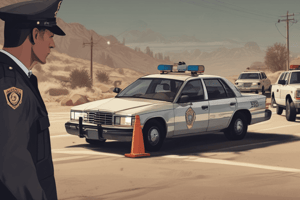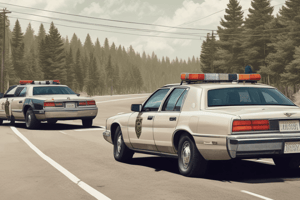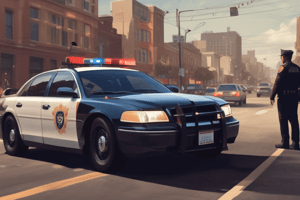Podcast
Questions and Answers
What should you establish from the very outset of a traffic stop event?
What should you establish from the very outset of a traffic stop event?
What question should you ask if the officer requests information or documents?
What question should you ask if the officer requests information or documents?
Why is it important to ask 'Am I free to go' several times during the encounter?
Why is it important to ask 'Am I free to go' several times during the encounter?
What can be used against you in a court of law?
What can be used against you in a court of law?
Signup and view all the answers
What can happen if you do not personally establish that you do not agree to be stopped?
What can happen if you do not personally establish that you do not agree to be stopped?
Signup and view all the answers
According to statutory law, what is the time limit for being stopped?
According to statutory law, what is the time limit for being stopped?
Signup and view all the answers
What is the first objective of the officer in dealing with you?
What is the first objective of the officer in dealing with you?
Signup and view all the answers
What are the three categories that a police officer's stop can fall into?
What are the three categories that a police officer's stop can fall into?
Signup and view all the answers
What should you do if you are pulled over by a law enforcement officer?
What should you do if you are pulled over by a law enforcement officer?
Signup and view all the answers
Why is it important to establish a courteous beginning when interacting with a law enforcement officer?
Why is it important to establish a courteous beginning when interacting with a law enforcement officer?
Signup and view all the answers
What should you say to get a request on the record?
What should you say to get a request on the record?
Signup and view all the answers
What should you ask to let the officer know that you want him to respect your rights?
What should you ask to let the officer know that you want him to respect your rights?
Signup and view all the answers
What should you ask if the officer is still attempting to detain you after the fourth question?
What should you ask if the officer is still attempting to detain you after the fourth question?
Signup and view all the answers
What should you ask if the officer claims to have a well founded probable cause?
What should you ask if the officer claims to have a well founded probable cause?
Signup and view all the answers
What can you say to a police officer if you feel they may become violent?
What can you say to a police officer if you feel they may become violent?
Signup and view all the answers
What should you do if a police officer refuses to give you their business card?
What should you do if a police officer refuses to give you their business card?
Signup and view all the answers
When can a traffic law violation charge be defeated on constitutional grounds?
When can a traffic law violation charge be defeated on constitutional grounds?
Signup and view all the answers
What should you do if you are asked to sign anything like a citation?
What should you do if you are asked to sign anything like a citation?
Signup and view all the answers
Study Notes
Tips for Handling a Traffic Stop
- Being pulled over by a law enforcement officer (LEO) can be an anxiety-inducing event, but it's important to remain calm and courteous.
- Understand that the officer may be acting as a revenue agent for a foreign municipal or corporate state government, and they have limitations to their authority.
- Establish a courteous beginning to the encounter to inform the officer that you know your rights and expect them to be honored.
- There are three categories of a police stop: consensual contact, detention, and arrest. How you handle the encounter at the beginning determines which category the stop falls into.
- Question the authority of anyone who approaches you claiming to represent a government agency.
- If the stop has nothing to do with an actual crime, establish that fact and put the officer on "good faith" notice that you do not consent to being detained.
- Once stopped, you have the right to be allowed to go within a reasonable time limit, which is typically 15 minutes.
- Use clear, concise statements and closed-ended questions that can be answered with a yes or no.
- Be aware that complying with the officer's requests without questioning or objecting to them can be deemed as consent.
- You have the right to ask the officer for their identification and to state that you do not consent to the contact.
- Ask specific questions to demonstrate your knowledge of your rights, such as the nature of their inquiry, whether their request is a demand, and your right to remain silent.
- If the officer attempts to detain you without probable cause, inform them that the detention is a false arrest and unlawful imprisonment.
Studying That Suits You
Use AI to generate personalized quizzes and flashcards to suit your learning preferences.
Description
Quiz: Know Your Rights - Asserting Yourself in Difficult Situations Test your knowledge of your rights and how to assert them in challenging situations with this informative quiz. Learn when it is within your rights to deny a request and how to accede to a demand "under duress." Discover the importance of exercising your right to remain silent and how to communicate effectively to ensure your rights are respected. Equip yourself with valuable information to confidently navigate difficult encounters.




